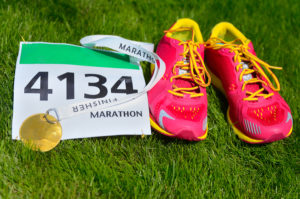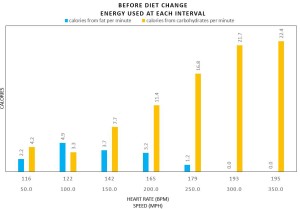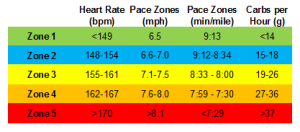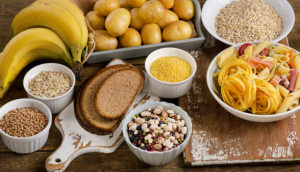How Sweat & Metabolic Testing Can Help You Run Your Best Marathon
How Sweat & Metabolic Testing Can Help You Run Your Best Marathon
So you’ve decided to take on one of the greatest running events on the planet: the marathon. Congrats! Now…how do you fuel properly for it?

It’s no coincidence that the first person to complete a marathon collapsed and died at the end. Let that be a lesson to illustrate how a well-executed fueling strategy can make or break your marathon performance. This strategy should be regularly tested in your training, and be ironed out by the time you reach 2+ hour training runs. While many people rely on trial and error, we now have easily accessible testing methods to help you develop your personalized fueling plan.
What Energy Sources Help You Run?
First, it’s important to understand the types of energy sources that contribute to running. Carbohydrates and stored fats are the primary sources of energy expended during running, although their percentages vary based on your intensity. The slower you run, the fewer total calories you burn per minute, yet the greater the contribution of fats there is during exercise. Conversely, the faster you run, the more calories you burn per minute with carbohydrates contributing most, if not all, of the energy for exercise. Fat is stored in abundance and provides more than twice the energy that carbohydrates do. While carbohydrates are stored in limited supply, they are more readily available for exercise. In addition, carbohydrates consumed during exercise are easily used for exercise too.
In this example, you’ll see how the blue lines are calories expended from fat (they go down as intensity increases) and the yellow lines are calories expended from carbohydrates (they go up as intensity increases). This was stolen from the Fat for Fuel: The Grand Experiment (another great read about how nutrition and metabolic testing can affect performance).

How Metabolic Testing Can Determine Your Carbohydrate Needs
A common method to assess how efficient you are at burning carbohydrates or stored fat for fuel is using a metabolic cart, or VO2 testing. During this test, not only can you measure total calories burned, but also calories from fat and calories from carbohydrates. Using that information, we can determine how much you can consume before, during and after exercise. Since blood is diverted away from the gastrointestinal (GI) tract during exercise, especially during high intensity races (this includes even the marathon), excess carb consumption can slow your performance and increase the potential for uncomfortable side effects like belching, side stitches, nausea and vomiting. Furthermore, without enough carbohydrates, high intensity performance will suffer. “Training your gut” by testing your fueling strategy during training at the appropriate intensities will ensure success on race day.
Below, you’ll notice an example of carbs to consume per hour based on one individual’s metabolic testing results:

Why Are Carbohydrates So Important In The Marathon?
If you’ve ever waited somewhere around mile 21, you may have witnessed (or experienced yourself) runners “bonking,” or depleting their stored carbohydrates. This generally occurs after about 2-3 hours of racing, and results in a marked performance decrease. Using metabolic testing, it’s easy to determine the necessary amount of carbohydrates to replenish. In my experience, most people can tolerate about 25-45g in divided doses at regular intervals of carbohydrates in the form of sports drinks, gels, chews, dried fruit, crackers, rice balls, or energy bars will help avoid this. Some people can tolerate up to 60-70g, but this is less common due to the jarring nature of running. Keep in mind that everyone is different, thus every fueling plan should be unique and trialed multiple times before race day.

Sweat Testing To Avoid Dehydration
More commonly than bonking, marathoners will experience dehydration, due to excess sweating. Keep in mind that sweating is your body’s cooling mechanism and everyone’s sweat is unique. If you sweat excessively, or have trouble with cramping, runner’s trots, nausea or dizziness, you may need a more personalized solution. Sweat testing is a painless procedure where your total fluid and electrolyte loss is measured using skin patches that absorb your sweat. This allows us to develop a customized hydration plan so you can perform your best. Even so, it’s still important to practice your hydration plan in training.
General Hydration Guidelines
To avoid dehydration, as a general guideline, consume 12-28oz of fluid per hour during the event, ensuring total fluid losses not to exceed 2% of your total body weight. Doing pre and post weigh-ins during training will help you gauge total fluid losses. The hotter it is on race day, the more you’ll need to keep cool. Drinking icy-cold fluids before and during the event helps manage core body temperature. Need more guidelines?
Download our free hydration guide here:
Avoid Hyponatremia
Slower marathoners, especially 5+ hour female runners, are at higher risk of hypoglycemia, or water intoxication. In other words, the electrolytes in your blood get overly diluted from drinking only water (or too much of it) and the consequences are very serious. Symptoms are weight gain, “sloshy” stomach, bloating, headache, confusion, vomiting and muscle weakness. Be sure to avoid drinking too much, or having “clear pee” before the race. Drink at regular intervals using a full-strength sports drink or other electrolyte replacement during the event.
Remove the Guesswork
Regardless of how fast you plan to finish a marathon, be sure to plan and test your fueling and hydration strategy in training. Sweat and metabolic testing are easily accessible methods to create a personalized and simplified fueling plan that removes the guesswork and excess trial and error. Remember, you’re fueling plan should be unique as you are!
Sign up for sweat and metabolic testing here to get your personalized fueling marathon guidelines!



